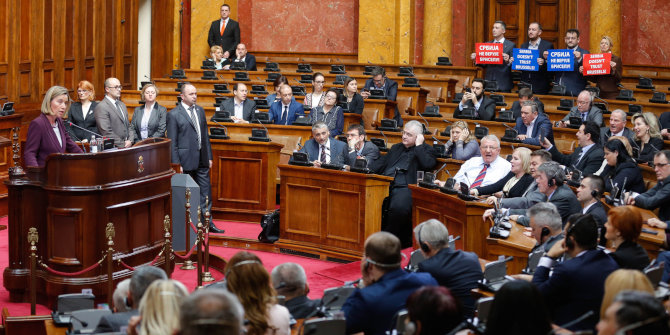Northern Ireland held elections on 2 March against the backdrop of the UK’s preparations for leaving the European Union. Janice Morphet writes that Brexit raises several important questions about Northern Ireland’s status within the UK which could also have a major impact on the nature of devolution across the rest of the country.
Despite the intermittent warm words and flying visits by UK politicians, the appreciation of Northern Ireland’s position following the UK’s EU referendum is minimal. Never has ‘out of sight out of mind’ been more apparent as a distracted Whitehall and Westminster grapple to understand the basis of negotiations with the EU. Yet as with the rest of the Brexit agenda, the position in Northern Ireland is as fluid as that in London but with less national media coverage or understanding.
There are many major issues to address. The context in which they will be framed and considered is crucial. The Northern Ireland Assembly reflects a greater division between power sharing parties than has been the case since the last major breakdown between 2002-2007. Changes in the leadership of both the DUP and Sinn Fein in the last fourteen months have brought together two new leaders who seem to share none of the bonds of their predecessors. The collapse of power sharing following a failure to agree an investigation into the renewable heat incentive scheme and subsequent elections in 2017 have been an inevitable outcome. Even following this election, the issue of the disputed scheme remains to be investigated and serves as a strong distraction from the Brexit issues that Northern Ireland faces.
These fissures then create difficulties for any cross-party agreements on how to represent the interests of Northern Ireland in the internal discussions now taking place with the UK government. Unlike Wales and Scotland, the Northern Ireland Executive has made no preparations for Brexit, issued no statements or reports about the issues to be addressed and the Democratic Unionist Party (DUP) appears to be in denial that these negotiations are taking place. In contrast, Sinn Fein has issued a report on the issues, has managed to obtain the European Parliament’s agreement for additional peace funding after Brexit, and is touring the EU capitals making a case for special status for Northern Ireland during and after the Brexit negotiations. As strong Brexiteers, the DUP appear to consider that the UK post-Brexit will reflect the status quo in respect of legislation, powers and EU funding. This will not be the case.
So what challenges does Northern Ireland face as Brexit negotiations progress? The negotiations will represent a dynamic process and it will be important for those representing it to remain in touch and on top of the issues to ensure that its case is put forward and acknowledged. There is recognition by the UK government and the EU that the Good Friday Agreement will need to be specifically addressed and this was one of the key points in the Conservative government’s Brexit White Paper.
However, in the review of Brexit issues undertaken by the European Parliament, the Good Friday agreement has been recognised as one of the key agreements that will need to be amended and changed. Although registered with the United Nations as an international treaty, the Good Friday Agreement incorporates the respective roles of the signatories including the legal relationships within the EU. Once the UK leaves the EU, this will automatically change. Secondly, the Good Friday Agreement and subsequent devolution as contained in the St Andrews Agreement 2006 and the Fresh Start Agreement in 2015 are anchored to the subsidiarity principles contained in the Treaties of Rome, Maastricht and Lisbon. These create the foundation of the Northern Ireland Assembly, its powers, rights and responsibilities.
Thirdly, under the terms of the Vienna Convention on international treaties, one party to a treaty cannot change it by dint of amending its domestic legislation. So, the UK may wish to amend the Good Friday Agreement but may only do so if the other parties agree. This may bring a further legal challenge. The Agreement also rests on the European Convention of Human Rights and can be tested through the European Court of Human rights.
The Prime Minister has announced her intention to leave both the Convention and the jurisdiction of the court. This will further dismantle the agreement and the potential of the Council of Europe to act as a home for it as membership for this body also rests on ECHR adoption. Lastly, the Irish Taoiseach and the President of the European Commission have jointly agreed that the Good Friday Agreement will be part of the UK’s Brexit settlement and that in the event of a unified Ireland, then the North will be able to re-join the EU in a fast track process.
Another set of concerns relate to the internal border within the island of Ireland. There has been a common travel area (CTA) since partition and this issue has also been recognised in the Brexit White Paper. However, the Prime Minister’s statement that it is her intention to leave the European customs union as well as the EU single market means that there will need to be a combination of border controls with free movement for people but customs controls for goods.
Yet it is not so long since the north/south border was the most militarised in Europe with a limited number of approved crossings. Since the Good Friday Agreement, there are now approximately 30,000 people working across the border and well over a million movements across the border each month. Moreover, services have now been established for cross border communities such as health specialisms and education that could come under great pressure. Already firms are locating from Northern Ireland to the south to remain in the single market. Much of the UK’s EU trade is on the island of Ireland and the introduction of tariffs and quotas could have major effects on the economy of both north and south.
The retention of the common travel area also has other implications for the UK’s control of borders. The external border with the EU will in effect be the entry point into Great Britain rather than the United Kingdom. Other options would include the creation of a hard EU border in Ireland, but this seems unlikely to be acceptable. This suggests that there may be issues over migrants travelling to the island of Ireland in the hope of accessing mainland Great Britain with all the ramifications to consider that were apparent in Calais.
A third set of considerations relate to the position of Ireland. The Irish government joined the EU at the same time as the UK in no small part because of the implications of the Irish punt being tied to the pound. This is no longer the case and Ireland is a member of the Eurozone. The Irish government has held two all island civic dialogues and has initiated studies of all the major sectors likely to be affected by Brexit. Here too there will be some political instability as a change in the Taoiseach and a new government occurs. In the immediate period before this change, there will be an opportunity for the Taoiseach to be more outspoken and critical of the UK, to criticise the lack of discussion on joint arrangements, and outline the solutions that Ireland would prefer.
These considerable challenges also cast a light on more fundamental issues for the UK. While much of the focus of the effect on devolved governments has been on Scotland’s future, it has also demonstrated that after nearly twenty years since being signed, the institutional arrangements that were set up by the Good Friday Agreement have already been weakened or fallen into practical disuse. The agreement’s institutions should have been a key focus for these discussions and a mechanism by which to evaluate the implications of options in negotiations but they are not strong enough for this to be the case.
Once again this demonstrates that Scotland, Wales and Northern Ireland are off the government’s radar in London. High profile meetings, hand shaking for the media and platitudinous statements about respect and recognition are quickly shown as tenuous when any attempt is made to act upon them. Yet Brexit goes to the heart of the devolved settlements. The implementation of the Barnett formula is anchored to the principle of economic and social cohesion in the treaties. Devolution in Scotland, Wales and Northern Ireland rests on the principle of subsidiarity, successively strengthened in the Maastricht and Lisbon treaties. Devolved governments are responsible for the implementation of EU directives and regulations even if they do not negotiate them.
How will the negotiation proposals be evaluated within this context? Post Brexit, when these EU treaties are no longer valid in the UK, what legal basis will the devolved governments have? How will their powers and responsibilities be secure and what legislation will govern this? Without a written UK constitution, how can the long-term rights and responsibilities of these devolved institutions be secured when they can be changed on a parliamentary whim?
For Northern Ireland, the past is staring it in the face and just how far will this backward look extend? Northern Ireland receives funding and support from EU cohesion funds together with its own PEACE programme. It has interdependent energy and water networks for the whole island and it will be outside Great Britain for its borders with the EU. What are the implications of this? Whitehall and Westminster will need a far greater focus on these issues than has been demonstrated hitherto.
On the other hand, a traditional London preference for control, with the UK governance system already the most centralised in the OECD, appears to be a fall-back position. With no principle of subsidiarity that can be secured through the ECJ, a return of centralised rule for all the devolved administrations, London and the cities will have no external recourse. While the rest of the world is moving toward more localised governance systems, the UK government is taking the opportunity provided by Brexit to recentralise that which has been devolved to the local level. There are ways to avert this, but there is a danger that they will get lost in the disruption and potential chaos that is to come.
Janice Morphet’s new book, Beyond Brexit? How to assess the UK’s future, has just been published by Policy Press
Please read our comments policy before commenting.
Note: This article gives the views of the author, and not the position of EUROPP – European Politics and Policy, nor of the London School of Economics.
_________________________________
 Janice Morphet – University College London
Janice Morphet – University College London
Janice Morphet is Visiting Professor at the Bartlett School of Planning at University College London.






Janice’s analysis of the possible consequences of the renunciation of the European Treaties poses numerous questions. The fundamental problem in my view is the assumption by politicians in England that the organs of government and the constitution are equipped to deal with all this. The more one considers the legal ramifications, the economic issues and the geo-political consequences the more difficult it becomes to understand this “one policy fits all” approach of Mrs May’s ‘Brexit’ government. The policy of the government appears to take little account of the cultural, legal, political, economic and other differences of the peoples of these islands. History is said not to repeat itself although some foreign policy experts memoirs suggest it does.. It would be sad if the mistakes of the past were repeated, save that this time it may be that the promise of King George V on opening the Parliament in Northern Ireland that it was the forerunner of the day north and south would be re-united is possibly now more likely because of the intended renunciation.
Perhaps the Prime Minister ought to read the excellent “Letters to America” by Edmund Burke to understand how not to govern English speaking colonies.